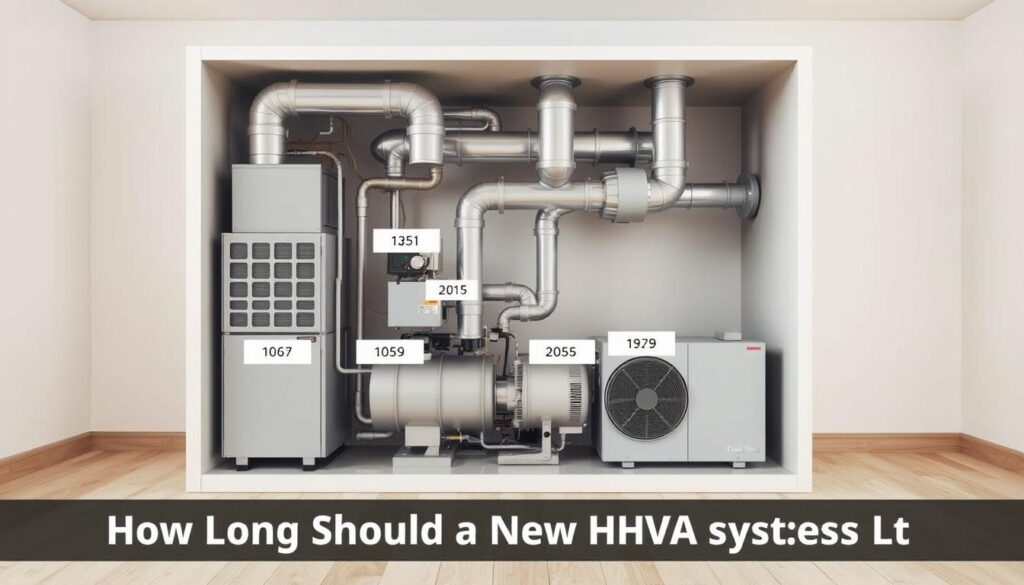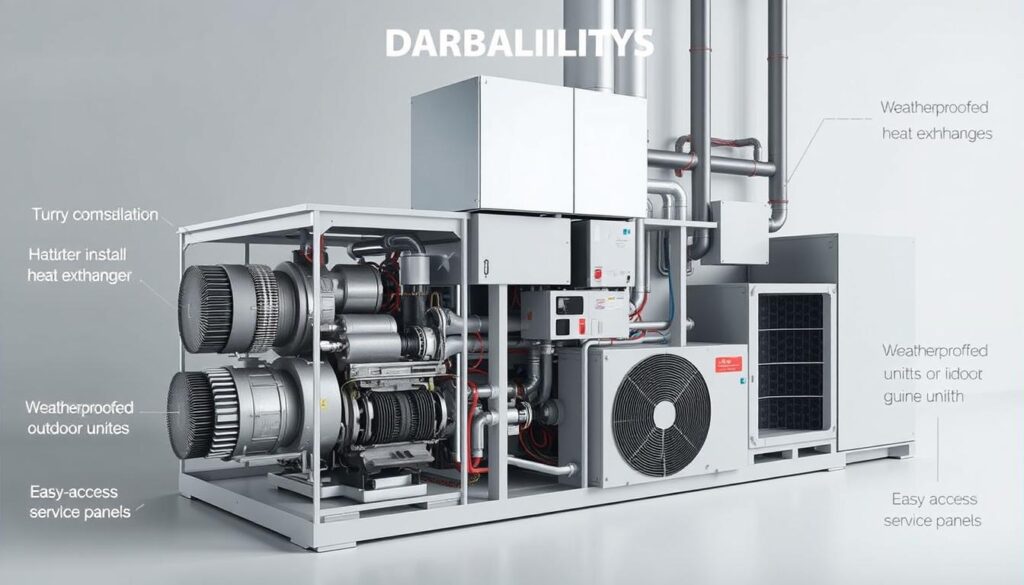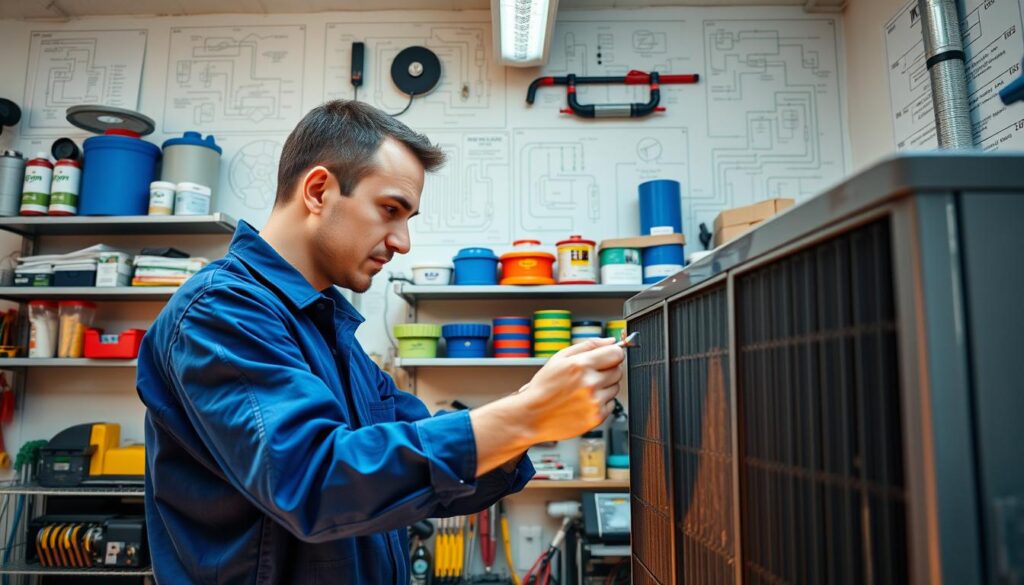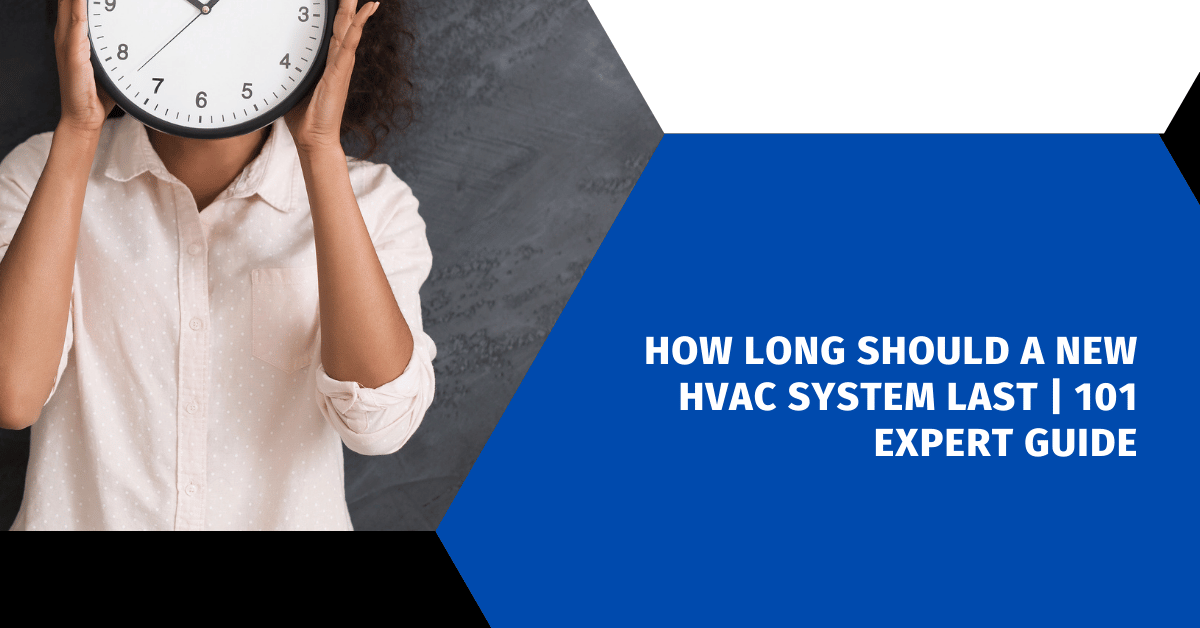Affiliate Disclosure
HVAC Guide Guys is a participant in the Amazon Services LLC Associates Program, an affiliate advertising program designed to provide a means for sites to earn advertising fees by advertising and linking to Amazon.
How Long Should a New HVAC System Last? Ever thought about how long your home’s HVAC system will last before needing a big replacement? Knowing how long an HVAC system lasts is key for homeowners. It helps you make smart choices and keep your home comfy.

A typical home HVAC system can last 10 to 25 years. This depends on several important factors. Knowing how long a new system should last helps you plan for upkeep and future replacements.
Your HVAC system is a big investment in your home. Understanding its lifespan helps you keep your home comfy, save on energy, and control maintenance costs over time.
Key Takeaways
- Typical HVAC system lifespan ranges from 10-25 years
- Regular maintenance can significantly extend system durability
- Different HVAC components have varying expected lifespans
- Environmental factors impact overall system longevity
- Professional installation plays a critical role in system performance
- Energy efficiency decreases with system age
- Proactive monitoring helps prevent unexpected breakdowns
Table of Contents
Understanding HVAC System Basics and Components
Your home’s comfort depends on a well-functioning HVAC system. These complex networks of heating, ventilation, and air conditioning components work together. They maintain ideal indoor temperatures and air quality. Knowing how HVAC systems work can help you make smart choices about when to replace them and how long they last.
Types of HVAC Systems
Different HVAC systems fit different homes and climates. The most common types include:
- Split Systems: Featuring indoor and outdoor units
- Hybrid Systems: Flexible fuel options for heating
- Ductless Mini-Split Systems: Targeted heating and cooling
- Packaged Heating and Cooling Units: Compact, space-saving design
Essential Components of Modern HVAC Systems
A typical HVAC system has several key parts. They work together to control your home’s temperature and air quality.
| Component | Primary Function | Typical Lifespan |
|---|---|---|
| Furnace | Heating air and distributing warmth | 15-20 years |
| Air Conditioner | Cooling and dehumidifying | 15-20 years |
| Heat Pump | Heating and cooling | 10-15 years |
| Thermostat | Temperature regulation | 10-15 years |
Role of Each Component in System Longevity
Each HVAC component is vital for the system’s performance and durability. Regular maintenance is essential to extend your system’s life. It can boost efficiency by up to 30% and prevent breakdowns that affect your comfort.
By grasping these HVAC basics, you can take proactive steps. This includes maintenance, repairs, and replacements. It ensures your home stays comfortable and energy-efficient.
Explore Our HVAC Shop
Looking for top-rated HVAC tools, parts, and accessories? Visit our shop and find the perfect solution for your needs.
Visit the ShopHow Long Should a New HVAC System Last
Knowing how long your HVAC system will last is key for home upkeep and budgeting. Most modern systems are built to last 15 to 20 years. Some top-notch systems might even reach up to 30 years with the right care.
The life of your HVAC system depends on several important factors. These factors can greatly affect its performance and how long it lasts. Each part of the system has its own expected lifespan:
- Furnaces: 15-20 years
- Central Air Conditioning Units: 12-17 years
- Heat Pumps: 10-15 years
- Geothermal Heat Pumps: 25-30 years
As your system ages, its efficiency will naturally drop. Keeping it well-maintained is vital to extend its life and keep it running smoothly.
| HVAC Component | Average Lifespan | Maintenance Impact |
|---|---|---|
| Furnace | 15-20 years | Annual professional service |
| Central AC | 12-17 years | Regular filter replacement |
| Heat Pump | 10-15 years | Bi-annual professional check |
Your HVAC system’s lifespan is not just about time—it’s about smart maintenance. Regular filter changes, professional checks, and careful use can make your system last longer. This keeps it running at its best.
Explore Our HVAC Shop
Looking for top-rated HVAC tools, parts, and accessories? Visit our shop and find the perfect solution for your needs.
Visit the ShopExpected Lifespan of Different HVAC Components
Knowing how long your HVAC parts last is key to a comfy home. Age guidelines help you plan for replacements and budget for the future. Quality signs can show how well your systems will last.
Furnace Longevity: Built to Last
Gas furnaces are a big deal for home comfort. With care, they can last 20 to 30 years. But, if ignored, they might only last 10 years or less. Important signs of quality include:
- Consistent heating performance
- Minimal repair frequency
- Energy efficiency ratings
Air Conditioner Performance Expectations
Central air units usually cool well for 15 to 20 years. But, things like upkeep, climate, and how well they’re installed matter. Places near the sea can cut a unit’s life to 7-12 years because of salt and corrosion.
Heat Pump Durability
Heat pumps are great for both heating and cooling, lasting about 10 to 15 years. Those used all year might not last as long. Keeping them well-maintained and getting them checked by pros can help them last longer.
Proactive maintenance is the key to extending the life of your HVAC components.
Your HVAC’s life depends on many things, like how well you take care of it, how much you use it, and the environment. By knowing these age guidelines, you can make smart choices about caring for and possibly replacing your systems.
Factors Affecting HVAC System Durability

To understand hvac durability, we must look at many factors. Your HVAC system’s life depends on key elements. These can either make it last longer or shorten its life.
Important factors for hvac longevity include:
- Installation Quality: A good installation by certified techs can make a big difference
- Maintenance Frequency: Regular tune-ups can add 5-10 years to your system’s life
- Environmental Conditions: Climate and air quality are big factors in wear and tear
- Usage Patterns: Using your system too much can wear it down faster
Environmental challenges can really affect your HVAC system. High humidity can cut efficiency by 5-15%. Dusty areas need air filters changed more often. Systems that are too small use 20-30% more energy, leading to quicker breakdowns.
Your home’s insulation is also key to hvac durability. Bad insulation makes your system work harder. This can shorten its life by putting extra strain on parts.
Proactive maintenance is the key to maximizing your HVAC system’s longevity and performance.
By managing these factors well, you can protect your investment. This ensures your HVAC system works well for many years.
Explore Our HVAC Shop
Looking for top-rated HVAC tools, parts, and accessories? Visit our shop and find the perfect solution for your needs.
Visit the ShopSigns Your HVAC System Needs Replacement
Knowing when to replace your HVAC system can prevent sudden failures and high energy bills. It’s important to recognize the signs of an aging system. This helps you plan when to replace or upgrade your HVAC.
Your home’s comfort relies on a working HVAC system. As systems get older, they work less efficiently and face more issues.
Performance Indicators
- Inconsistent temperature throughout your home
- Unusual noises during operation
- Frequent cycling on and off
- Poor air quality or increased dust
- Weak airflow from vents
Age-Related Warning Signs
HVAC systems usually last 15 to 25 years. Important age signs include:
- System is over 12 years old
- Repair costs exceed 50% of replacement value
- Declining energy efficiency
- Persistent humidity control issues
Cost-Efficiency Considerations
Looking at the cost of your HVAC system is key. New systems can cut energy bills by up to 30% compared to old ones. Think about replacing if:
- Annual repair costs exceed $500
- Energy bills keep going up
- Your system uses outdated R-22 refrigerant
- Efficiency has dropped a lot
Replacing your HVAC system on time can avoid sudden failures. It ensures your home stays comfortable and energy-efficient.
Essential Maintenance Tips for Extended HVAC Life

Keeping your HVAC system in good shape is key to its long life and best performance. Regular upkeep boosts hvac efficiency over time. It saves you money and avoids sudden breakdowns.
Here are important maintenance tips to protect your investment:
- Replace air filters every 1-3 months to prevent system strain
- Schedule professional tune-ups annually before heating or cooling seasons
- Keep outdoor units clear of debris and vegetation
- Check and clean evaporator and condenser coils yearly
- Inspect ductwork for leaks every 3-5 years
Maintenance is more than just keeping things running. It can extend your system’s life by years. Professional checks catch small problems before they become big, expensive fixes.
Think about getting a programmable thermostat to save energy. Setting the right temperatures and using the “auto” fan mode cuts down energy use without losing comfort.
Proactive maintenance is always more affordable than emergency repairs.
Consistent care is the best way to keep your HVAC efficient over time. Small, regular maintenance steps can stop big system failures. They keep your home cozy all year.
Explore Our HVAC Shop
Looking for top-rated HVAC tools, parts, and accessories? Visit our shop and find the perfect solution for your needs.
Visit the ShopImpact of Installation Quality on System Longevity
Your HVAC system’s performance and durability start with its installation. Professional installation is key to your system’s long-term efficiency and durability.
Bad installation can hurt your system’s performance a lot. Studies show it can lower HVAC efficiency by up to 30%. This can shorten your system’s life a lot.
Professional vs DIY Installation
Choosing between professional and DIY installation is a big decision. Professional installers offer important benefits:
- Precise system sizing
- Accurate ductwork design
- Proper refrigerant charging
- Compliance with local building codes
Importance of Proper Sizing
Choosing the right HVAC system size is very important. The wrong size can cause:
- 20% increase in energy costs
- Reduced system efficiency
- Premature system wear
- Inconsistent indoor temperatures
Installation Best Practices
| Installation Practice | Impact on System |
|---|---|
| Correct Refrigerant Charge | Optimal cooling performance |
| Proper Ductwork Sealing | Improved energy efficiency |
| Adequate Ventilation | Enhanced system longevity |
Choosing professional installation means your HVAC system works better. It can last up to 5 years longer and save on repair costs.
Energy Efficiency and System Performance Over Time
Your HVAC system’s efficiency drops as it gets older. It’s key to know how efficiency changes over time to keep your home comfy and cut energy costs. New HVAC tech brings big boosts in performance and less energy use.
Old systems often can’t keep temperatures steady and use a lot of energy. Here are some important points about upgrading your HVAC:
- Systems over 20 years old usually have SEER ratings around 10
- Today’s minimum SEER ratings are 14, with top models hitting 20
- Upgrading can cut energy use by 20-40%
The U.S. Department of Energy says heating and cooling use about half of home energy. Getting a modern HVAC system is more than just comfort—it’s a smart money move.
“Modern HVAC technologies give homeowners great chances to cut energy use and lower bills.”
Upgrading can bring many benefits:
- Less money spent on energy each year (possible savings over $100)
- Better home comfort
- Less harm to the environment
- Less need for surprise repair costs
Comparing your current system to newer models can guide your upgrade decisions. This way, you can ensure long-term energy savings.
Explore Our HVAC Shop
Looking for top-rated HVAC tools, parts, and accessories? Visit our shop and find the perfect solution for your needs.
Visit the ShopModern HVAC Technologies and Their Durability
The world of HVAC is changing fast. Homeowners now have access to smart technologies that make systems last longer and work better. These upgrades focus on improving efficiency and extending the life of your HVAC.
New HVAC technologies are changing how we keep our homes comfortable. They offer advanced features that are key indicators of quality. These innovations do more than just cool and heat. They use smart tech to save energy and make systems last longer.
- Variable-speed compressors that reduce energy strain
- Smart thermostats with predictive maintenance alerts
- Geothermal systems with exceptional long-term performance
- IoT-enabled diagnostic monitoring
Today’s systems work well with smart home tech. This lets you control and maintain your HVAC from anywhere. You can monitor how your system is doing and fix problems before they start.
| Technology | Expected Lifespan | Key Benefits |
|---|---|---|
| Smart Thermostats | 10-15 years | Energy optimization, remote control |
| Variable-Speed Systems | 15-20 years | Reduced wear, improved efficiency |
| Geothermal Heat Pumps | 25-50 years | Sustainable, minimal environmental impact |
The future of HVAC is not just about cooling and heating, but creating intelligent, sustainable home comfort solutions.
New trends are moving towards electric, eco-friendly systems. These systems promise to last longer and work better. By choosing these technologies, you can make your home more comfortable and energy-efficient.
Conclusion
Knowing how long your HVAC system will last is key to keeping your home comfy and efficient. A well-cared-for system can last 15 to 25 years. But, several factors can affect this.
Keeping up with maintenance and upgrading on time can make a big difference. This helps your heating and cooling work better and last longer.
Don’t underestimate the importance of HVAC maintenance. Regular checks and replacing filters can make your system last longer and avoid expensive repairs. When your system hits 15-20 years, it’s time to check its efficiency and how often it needs repairs.
Deciding whether to fix or replace your system depends on costs and energy savings. Think about higher energy bills, uneven temperatures, and the benefits of newer, more efficient systems. Modern HVACs with high SEER ratings can save you money and make your home more comfortable.
Being informed and proactive about your HVAC’s health is the smartest move. By knowing its parts, watching its performance, and doing regular maintenance, you can extend its life. This saves you money and keeps your home comfortable.

